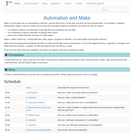
A Software Carpentry lesson to learn how to use Make Make is a tool which can run commands to read files, process these files in some way, and write out the processed files. For example, in software development, Make is used to compile source code into executable programs or libraries, but Make can also be used to: run analysis scripts on raw data files to get data files that summarize the raw data; run visualization scripts on data files to produce plots; and to parse and combine text files and plots to create papers. Make is called a build tool - it builds data files, plots, papers, programs or libraries. It can also update existing files if desired. Make tracks the dependencies between the files it creates and the files used to create these. If one of the original files (e.g. a data file) is changed, then Make knows to recreate, or update, the files that depend upon this file (e.g. a plot). There are now many build tools available, all of which are based on the same concepts as Make.
- Subject:
- Applied Science
- Computer Science
- Information Science
- Mathematics
- Measurement and Data
- Material Type:
- Module
- Provider:
- The Carpentries
- Author:
- Adam Richie-Halford
- Ana Costa Conrado
- Andrew Boughton
- Andrew Fraser
- Andy Kleinhesselink
- Andy Teucher
- Anna Krystalli
- Bill Mills
- Brandon Curtis
- David E. Bernholdt
- Deborah Gertrude Digges
- François Michonneau
- Gerard Capes
- Greg Wilson
- Jake Lever
- Jason Sherman
- John Blischak
- Jonah Duckles
- Juan F Fung
- Kate Hertweck
- Lex Nederbragt
- Luiz Irber
- Matthew Thomas
- Michael Culshaw-Maurer
- Mike Jackson
- Pete Bachant
- Piotr Banaszkiewicz
- Radovan Bast
- Raniere Silva
- Rémi Emonet
- Samuel Lelièvre
- Satya Mishra
- Trevor Bekolay
- Date Added:
- 03/20/2017


